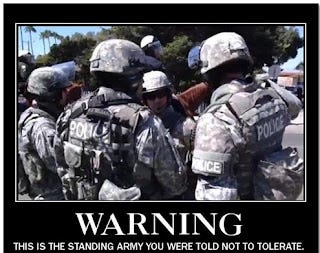Former police chief says police should stop hiring bullies

Professor John DeCarlo spent 34 years as a police officer and chief in Connecticut.
Robert Siegel host:
Siegel: And do you feel those people can be identified before they become police officers or early on in their police careers? How do you do that?
Decarlo said police training now is "very militaristic." He adds, "We are looking, very often, for big people. Women are underrepresented wildly, and we know that women are much better at talking their way out of bad situations than big guys. Right now we give cops a test called the MMPI-2, the Minnesota Multiphasic Personality Inventory. So we pretty much determine that they're not psychopaths. I think that's a low bar.
DeCarlo: We have not only talked about the fear that one feels at that point and the reaction that an officer might have, but we also talked about how certain people will be predisposed to different reactions, and it is incumbent upon police leaders to really increase the efficacy of police selection processes so that we do not put people on the job who would be bullies.
Leo Kisnerman: Kind of added fire to it because if you ask people what they want their police officers to be, they always want them to be, you know, scary, take care of crime. But that's, in reality, what we don't need. We need police officers to be friendly, get with the community, do their job. So be guardians, not warriors.
Here's a short list of the things police are tested for:
Psychopathic Behavior;
Deviate Paranoia;
Schizophrenia;
Hysteria;
Social Introversion
The MMPI-2 test has a "Validity Scale" or grading system, much like when you were in school but this one allows police candidates to be evasive or lie.
Below is a short list of ways potential cops are graded for lying
MMPI-2 Psychological Tests:
The "Cannot Say" Scale is simply the number of omitted items (including items answered both true and false).
The L scale originally was constructed to detect a deliberate and rather unsophisticated attempt on the part of the respondent to present him/herself in a favorable light.
The F Scale is an index of test-taking attitude and is useful in detecting deviant response sets (i.e. faking good or faking bad).
Correct me if I'm wrong but doesn't getting an 'F' in school mean you've flunked the exam? Why doesn't the jury and the accused get to view an officers MMPI-2 records? If you don't know the answer to that you haven't been paying attention. Police unions have become the most powerful unions in the country. Click here & here to read more.
The K Scale was developed as a more subtle and more effective index of attempts by examiners to deny psychopathology and to present themselves in a favorable light or, conversely, to exaggerate psychopathology and to try to appear in a very unfavorable light. Some people refer to this scale as the "defensiveness" indicator.
The TRIN scale was developed to identify persons who respond inconsistently to items by giving true responses to items indiscriminately or by giving false responses to items indiscriminately.
If you're confused after reading the language, join the club. Keep this in mind the next time you have a police encounter he or she could have any number of psychiatric issues.
Remember Chief DeCarlo warned everyone these MMPI-2 tests are questionable at best in detecting bully or militaristic cops and the public NEVER gets to see the results! Unfortunately for you, all of your psychiatric records can and will be read by the police and the jury, did you expect a level playing field with our justice system?
Last year former police chief DeCarlo warned about police working for private companies:
“If I were a company, and I was funding a police department, I would ultimately want things to go the way I wanted them to go,” he reasons. “I don’t see that there’s accountability to the public built into private companies…We don’t even know what their political agenda is.” In short, it’s important to make sure they won’t be beholden to whoever’s furnishing them with money. That said, DeCarlo pointed out that the practice, which the Journal called “unusual,” isn’t all that foreign. Police officers are frequently hired by nongovernmental organizations like water companies and shopping malls, yet they’re granted many of the same powers as when they're working for municipal departments.
“With municipal pensions being the issue that they are, and governmental funding and taxes going the way they are, we are going to see a trend in the United States toward more privatization in policing than less,” he says.
The most lucrative privatized policing jobs are also the ones that are the most ingrained in police departments. They’re what DeCarlo calls “private duty jobs.” These jobs, which are often arranged through police departments, send uniformed officers to work for private contractors, like when a cop stands over an uncovered manhole or when a cop stands guard at a movie theater. These jobs can pay as much as $50 an hour, which means that the average entry-level cop—who, DeCarlo estimates, might make a little more than $40,000 a year—can almost double his or her income by regularly working private duty jobs.


